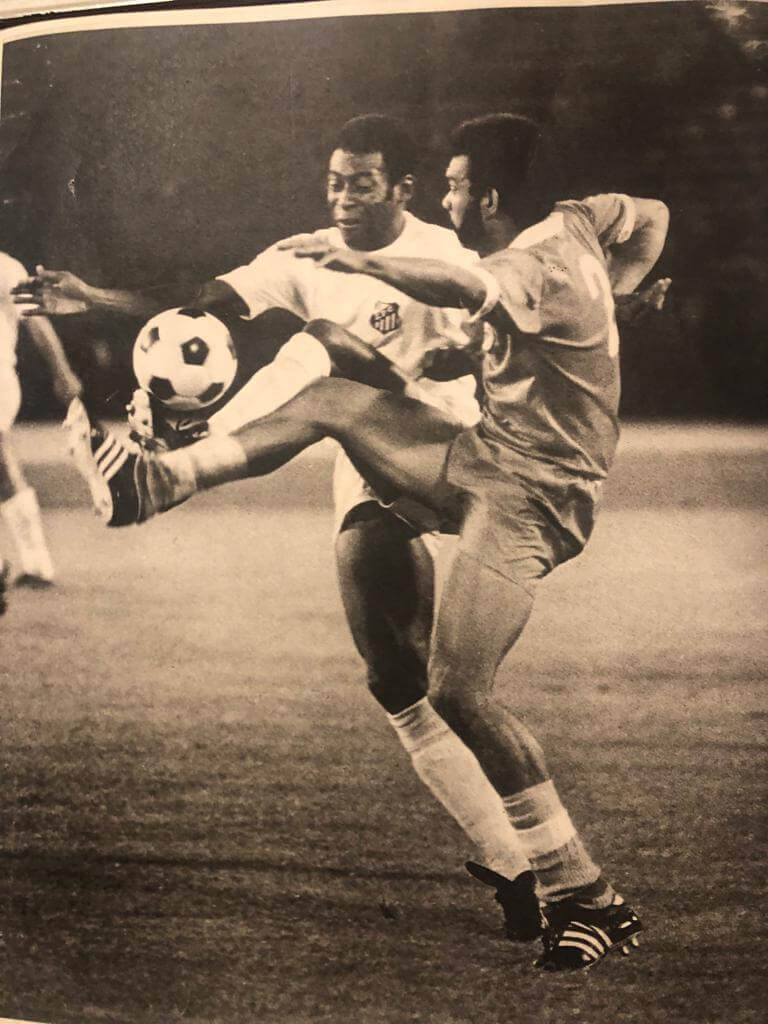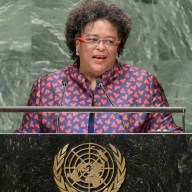The Paris-based United Nations Educational and Cultural Organization (UNESCO) said on Thursday that it was “deeply saddened” over the death of football (soccer) legend Pelé.
The UN said Pelé, the Brazilian football icon, who many regarded as the greatest player of all time, died on Thursday in a hospital in Sao Paulo at 82.
He had been undergoing treatment for colon cancer since last year, the UN said.
UNESCO, which champions the power of sports across the world, tweeted that it was “deeply saddened” at Pelé’s passing, and extended condolences to the Brazilian people and the wider “football family”.
UNESCO also said in its tweet that Pelé had “worked relentlessly to promote sport as a tool for peace. He will be greatly missed.”
As a 17-year-old, Pelé won his first football or soccer World Cup, in 1958, going on to lift the top trophy in the game a further two times, in 1962 and 1970, the UN said.
It said he scored a world record 1,281 goals, playing in 1,363 games during his professional career, which began when he was just 15.
Born Edson Arantes do Nascimento, in 1940, the football giant, nicknamed, “the Black Pearl”, and “the King”, retired from the game in 1977, the UN said,
In 1999, it said the Santos player and Brazil’s most venerated star, was voted player of the century in a poll of previous Ballon d’Or winners – the players who win the annual global football award for being the outstanding performers that year.
The UN said Pelé “devoted considerable time in retirement” to supporting the UN and its work, both as a Goodwill Ambassador for the UN Children’s Fund (UNICEF) and as a UNESCO Champion for Sport, from 1994.
He was also appointed Goodwill Ambassador for the crucial UN Earth Summit, in Rio de Janeiro, in 1992, one of the first major global development and environment summits devoted to a more sustainable future for all, the UN said.
At the time, the Secretary-General of the Summit, Maurice Strong, described Pelé as not only the greatest footballer in the world but as “a universal man”, rooted in Brazil.
“His commitment to people, to the planet, really distinguish him a true citizen of our earth”, Strong told reporters.
In a tweet, the head of UN refugee agency, UNHCR, Filippo Grandi, wrote that “we are all with the people of Brazil” tonight, “celebrating a man who made millions of kids dream across continents and generations.”
The Confederation of North, Central America and Caribbean Association Football (CONCACAF) on Thursday offered “sincere condolences to the family and friends of Brazilian football legend Pelé.
“Pelé was one of the greatest players of all time,” CONCACAF said. “He inspired players and fans of his and future generations, and brought joy to everyone who watched him play.
“The global football family will remember him as a true icon of the game,” it added. “RIP (Rest in Peace) Pelé.”
The International Federation of Association Football (FIFA), football’s world governing body, also paid tribute to “The King”, with anecdotes, achievements and statistics.
“’The King’ left an incomparable legacy in football,” said FIFA, noting that Dondinho and Celeste named their first son Edson after Thomas Edison, one of the greatest inventors in history.
FIFA said Pelé’s family nicknamed him “Dico”, but he received the moniker “Pele” in school “due to his mispronunciation of Brazilian goalkeeper, Bile.”
Dondinho was a lower-league footballer, FIFA said.
“To this day, I’m very proud that my father is the only player I know of who scored five headers in one game,” FIFA had quoted Pelé as saying.
It said Pelé immortalized the No.10 jersey across the globe – “but only by chance.”
“Brazil forgot to submit their squad numbers to FIFA for Sweden 1958, so they got chosen randomly,” FIFA said. “Virtually all made no positional sense – goalkeeper Gilmar and centre-back Zozimo were allocated the No. 3 and No. 9, respectively – but Pele, who began as a reserve, somehow got the number he duly made the most famous in football.
“Brazil goals is what Pele reached in merely 20 caps,” it added. “No other player in history has reached the quarter-century for international goals while still a teenager.”
Together for Brazil, FIFA said Pelé and Garrincha played six World Cup matches and several Copa America games, faced Argentina multiple times and took on European heavyweights such as England, France, Portugal, Soviet Union, Spain and West Germany.
“They incredibly never lost once,” FIFA said.
It noted that between one and two million people died during the Nigerian Civil War from 1967 to 1970.
“Astonishingly, a 48-hour ceasefire was called between the Nigerian government and the secessionist state of Biafra in 1969, so they could watch Pele and Santos draw 2-2 with the Nigerian Super Eagles, with ‘The King’ receiving incessant applause and a standing ovation from the home fans,” FIFA said.
It said Pelé was “the youngest scorer, youngest hat-trick scorer, youngest final player and youngest final scorer in World Cup history.
“Gunnar Gren, who competed against Brazil in the 1958 decider, made his Sweden debut before Pele was born. Never has such an age gap – 20 years – existed between opponents in a World Cup final,” said FIFA, adding: “Pele became the second man to score in four World Cups in 1970. He was pipped to the record by merely three minutes by West Germany’s Uwe Seeler.”
FIFA said Vava, Pele, Paul Breitner, Zinedine Zidane and Kylian Mbappe are the only players to have scored in two World Cup finals.
Pelé registered six assists at Mexico 1970 – a record for one World Cup. Four players managed five: Robert Gadocha at Germany 1974, Pierre Littbarski at Spain 1982, Diego Maradona at Mexico 1986 and Thomas Hassler at USA 1994, FIFA said.
It said Pelé also recorded an unprecedented three assist in deciders: one against Sweden in 1958 and two against Italy in ’70.
FIFA said “The Beautiful Game”, a universally-used nickname for football, was coined by Pelé.
“He also baptized Brazil’s Mexico 1970 champions as ‘The Beautiful Team’, which also stuck,” it said.
FIFA said that when the New York Cosmos “sensationally brought Pele out of retirement in 1975, soccer’s popularity exploded.”
It said the Cosmos became “the most glamorous club on the planet, and ‘The King’ became the VIP of VIPs in NYC” (New York City).
FIFA said Pele’s presence drew “mind-blowing crowds to matches, seduced Muhammad Ali, Peter Frampton, Jagger, Elton John, Diane Keaton, Henry Kissinger, Robert Redford, Rod Stewart and Barbra Streisand into being Cosmos fans, coaxed Franz Beckenbauer, Carlos Alberto and Giorgio Chinaglia to the ‘Big Apple’, and inspired the club to the Soccer Bowl in his swan song.”
Pelé had a lead role in the 1981, John Huston-directed hit film, which also starred Sylvester Stallone, Michael Caine, Max von Sydow and Bobby Moore, about Allied prisoners of war playing an exhibition football match against the Germans, FIFA said.
It said Pelé appeared in several Brazilian soap operas, TV series and films, American movie hotshot and British mockumentary Mike Bassett: England Manager.
FIFA said Pelé netted six goals in merely two appearances against France, scoring a hat-trick in a 5-2 victory in the Sweden 1958 semi-finals and another treble, a 3-2 win in a Paris friendly in 1963.
It said the opponents Pelé scored most times for Brazil against were Paraguay (10 goals in nine games), followed by Argentina (eight in nine).
Four days before turning 80, FIFA said Pelé released “Acredita No Véio” (“Listen To The Old Man”), a track recorded with 2019 GRAMMY winners Rodrigo y Gabriela.
“Pele has loved music all his life and composed hundreds of tracks since the early 1960s,” FIFA said. “He famously carried a voice recorder with him everywhere because ‘a song can some into your head at any time – even at a World Cup.’”
In 1970, FIFA said Pelé was named the most famous person on the planet above John Lennon, Pope Paul VI, Paul McCartney, Muhammad Ali, Paul Newman, Queen Elizabeth II, Neil Armstrong, Elvis Presley, Clint Eastwood, Elizabeth Taylor, John Wayne and Barbra Streisand.
A few years later, FIFA said the brand Pelé was named the globe’s “second-biggest according to a survey – astonishingly bigger than oil and gas supermajors, banks, automotive manufacturers, airlines, telecommunications titans and everything other than Coca-Cola.”
FIFA said Pelé, Muhammad Ali and Jackie Robinson were the only sports personalities to make the much-publicized 1999 Time magazine compilation of “The Most Important People of the Century.”
“That same year, Pelé `was one of nine sportspeople bestowed by the International Olympic Committee with the ‘Athlete of the Century’ award, despite, amazingly, having never partaken in the Olympic Games,” FIFA said.
It said others included Carl Lewis, Mark Spitz and Nadia Comaneci – “three of the most triumphant athletes in Olympic history” – Steffi Graf and Michael Jordan.
FIFA noted that Pelé was the inaugural recipient of the Laureus Lifetime Achievement Award in 2000.
“Thank you for EVERYTHING, ‘King’,” FIFA said. “You will never know how much you meant to this sport.”



























